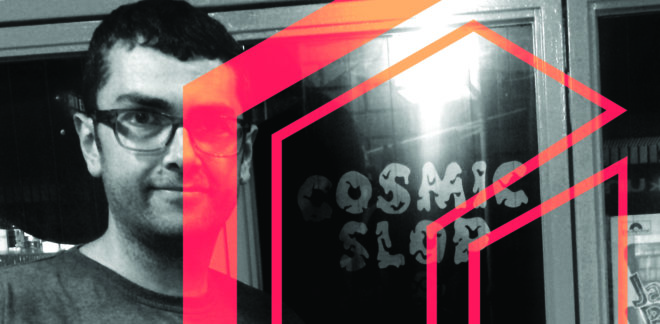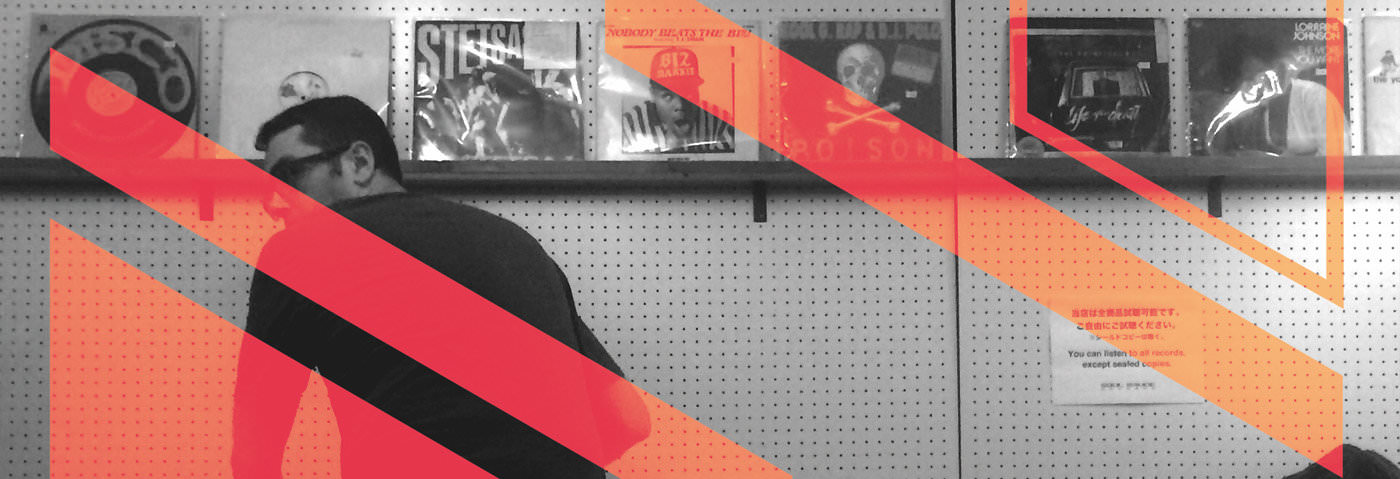What does ‘world music’ mean in 2017? Is it time to reconsider how we approach the term? Kristan Caryl finds out.
“Say ‘world music’ and people might think of Paul Simon dancing around on stage with Ladysmith Black Mambazo, something with bongos and esoteric chanting, an audience of 50-somethings wearing beads and hemp clothing…”
Mike Greenwell is well aware of the preconceptions that come attached to the sort of music he loves. Still, that doesn’t stop him playing it during his residency at esteemed Leeds party Cosmic Slop
, writing about it on his World Treasures Music blog or playing it on his KMAH Radio show of the same name.
“But this tunnel vision and stigmatised view does not account for the way times have changed,” he continues. “Get anthropological and trace where we, and music, comes from, and it’s all connected. Top DJs play music that is from Africa, or at least directly influenced by it. Listen to how Brazilian music and US soul are weaved together so expertly by numerous DJs nowadays. No one calls them ‘world music DJs’, it’s just great music.”
His own experiences of this music are as real as they come. Rather than a slapdash education via the genre categories of his favourite record stores, Greenwell has experienced Zamrock, kwaito, bubblegum and myriad African styles firsthand. As a former news journalist at the Nottingham Post turned lecturer at the Centre for Broadcasting and Journalism at Nottingham Trent University, work opportunities have taken the Bradford-raised, Beeston-based 36-year-old to Zambia (to media train young business, newspaper and radio journalists) and South Africa (to report on Balls To Poverty, a township football coaching project) on a few occasions.
I think there can be an inherent guilt complex with consuming this music... It can be perceived that there is an exploitative process going on
He has also travelled to South America, Africa, Morocco and Asia, has an MA in Peace, Conflict and Development studies at the University of Bradford and has interviewed some of the world music stars that are fawned over in the UK. These experiences inspired him to set up his blog, which is not about just selecting new releases from the so-called world music category, but is about covering music that resonates.
“I think that the world music tag can be pretty vague and unhelpful, as well as connoting a set of assumptions about what it is trying to describe,” he explains to me while on a trip to Japan. “I think there can be an inherent guilt complex with consuming this music: predominantly white, middle class, privileged music fans are able to visit developing countries and it can be perceived that there is an exploitative process going on, resources being extracted. It doesn’t sit well if you know the history of certain countries and the west’s interaction, but enjoying this music also means learning about a context and, subsequently, issues are raised.

“The blog and the radio show focus on the best reissues of original music from around the world, as well as interviews with rising stars and a focus on those artists who deserve more recognition. There’s esoteric music and stuff that is unique to a region or country, but I am especially interested in those junctions where music crosses over and possesses universal qualities and messages – from disco of Nigeria or the Middle East to Ghanaian rock, from South American new wave to outsider music regardless of origin.”
After studying with people from conflict-prone areas for an MA in Bradford, and during his work in Zambia and South Africa, Mike engaged directly with these issues. “The people I spoke to all said that history teaches us and we are evolving as people all the time; that the structural powers which impose evil things are not the same people as those who are celebrating a country’s culture. Arguably the international students I have encountered are already coming from a more privileged position and are in better positions than others from their country, so they can say that. And anyway, how much good does music consumption do in the bigger picture of unequal power relations between nations?”
As such, Mike recognises that appropriate recognition and formal licensing processes are essential when it comes to reissues of world music. Some labels do it right, and some don’t. Some source original masters, others bootleg from ripped MP3s, and in doing so bypass any payment to original rights owners. And then there are artists who try to sidestep the issue with increasingly subtle ‘edits’ that give them some tenuous claim over ownership.
“I wrestle a lot with these issues,” he says. “But often that’s because of my own background in cultural studies, having examined appropriation and counter-culture in history. My favourite sets of edits are by Lovefingers, on the Mindless Boogie label, or Theo Parrish’s Ugly Edits. They’re all interesting in various ways. Some were really obscure and helped [draw attention to] music that would otherwise be lost. Some were really cheeky and helped to redefine my idea of what would work on a dancefloor.”
I don't recall such a broad interest in music from around the world previously compared to now, yet it's a time when the UK has voted to become more isolated from, and less connected to, its neighbours
An example Mike gives of how to do it right and market this sort of music sympathetically involves Awesome Tapes From Africa boss Brian Shimkovitz, who he has interviewed at length. “He has forged the ethical and moral kinds of deals that have paid artists appropriately for their art, and even relaunched careers, such as in the case of Ata Kak [who, along with his label boss, played at Dimensions this year], while Invisible City Editions is a label that has worked closely with artists to sell dead stock from the artist’s own archives, interviewing them and bringing some grails to the light with comprehensive research. They have even halted reissuing something when there has been a subsequent family dispute with an artist’s legacy.”
In these globalised times where anyone with an internet connection can delve deep into the history of African music via tasteful reissue labels like Analog Africa, Voodoo Funk or Strut, Mike is mindful of a slight paradox. “I don’t recall such a broad interest in music from around the world previously compared to now, yet it’s a time when the UK has voted to become more isolated from, and less connected to, its neighbours [by leaving the European Union]. It seems absurd. That being said, it’s pretty unlikely that those who voted to leave are listening to music from around the world, strongly admire different cultures, or feel that globalisation is particularly positive.”
And he should know, because he sees firsthand who buys this sort of stuff at newly reopened Leeds record store Tribe Records. Mike is in charge of world music and the shop is run by Simon Scott, a Dimensions and Outlook director as well as the man behind the influential Sub Dub parties at the West Indian Centre.
When I was a student it was about going to techno, house or jungle nights and seeing who could get the most wrecked. But Tom introduced me to Fela Kuti and my tastes exploded
“Old customers are coming back in and new ones are enjoying the range we have. It’s a really popular section in the shop and we have male and female customers of all ages who are buying it. We also share Tribe with Artofficial, which is a shop dedicated to graffiti and street art materials, so there’s a great community of people and lots of characters knocking around.”
DJs claiming to be diverse and eclectic in their taste are nothing new, but in 2017, it means something different: rather than just mixing up house and techno, maybe some breaks, heavy bass and a dash of disco, eclecticism has been taken to whole new levels by DJs like Antal, Hunee and Floating Points. Smooth mixing is second to subversive selections that go from Japanese electronics to South African jazz via blue-eyed soul. And that is the vibe at Cosmic Slop, the now seven-year-old Leeds party that was started by Tom Smith and which funds Music and Arts Production, a charity that offers music and arts courses for young people who struggle in mainstream education.
After growing up with records scattered around the house, meeting Tom on a Leeds dancefloor aged 17 really opened Mike’s eyes and made him want to start DJing. “When I was a student it was about going to techno, house or jungle nights and seeing who could get the most wrecked. But Tom introduced me to Fela Kuti and my broad tastes exploded from psychedelic music and the great rock bands into what they are now.”

These days, you can find the pair most weekends – as well as together at Dimensions Festival – at Hope House in a gritty creative enclave on the edge of Leeds city centre, where they play back to back and alongside unannounced (and unpaid) guests like MCDE, Floating Points and Mr Scruff. The crowd is as diverse and open minded as any in the city. “Many students I encounter in Leeds are much more into a wide range of art, music and culture now,” says Mike. Musically, Freddie Hubbard might sit next to Wiley. John Martyn may well make way for Shackleton. As such, Slop is unlike many other club nights and is inspired more by David Mancuso’s Loft than anything else.
The world is a troubling place in troubling times and there's not much that can be done individually, but I think at Cosmic Slop we have always been mindful of playing music with a message
Mike says he and Tom often chat about political things such as issues of appropriation. “I say this with the caveat that I am only playing music. The world is a troubling place in troubling times and there’s not much that can be done individually, but I think at Cosmic Slop we have always been mindful of playing music with a message, and the artwork illustrated by Johnny Cosmic also draws attention to a range of ideas about wrongdoing in the world.
“The artists we play are often from countries or places that suffer inequality, or have been inspired creatively to express that oppression. How it is consumed and interpreted is up to the listener, but we’re lucky at Slop to have such an appreciative crowd. I am white, I am immensely thankful and lucky to have such a privileged existence, relatively speaking, but I also feel I am doing positive things.”
Using music as his medium, Greenwell, his blog and Cosmic Slop are spreading the right kind of messages. They are messages that ask you to think much deeper than your average dance party; messages that repurpose world music as something much more than a way to posture eclecticism.
